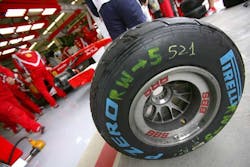While Vettel led from start to finish, he was the only driver not to be involved in the lively overtaking battles that characterized the race, just as had been the case in China three weeks ago. His team mate, Mark Webber, passed Ferrari’s Fernando Alonso to claim second with less than 10 laps to go. At the end of the 309.396-kilometer race, the top three were covered by just 10.075 seconds.
The top five finishers used a four-stop strategy for the first time this year. Jenson Button was obliged to concede two places in the closing stages of the race, finishing sixth for McLaren, after a three-stop strategy forced him to run on P Zero Silver (hard compound) tires that were seven laps older than those of his team mate. However, Virgin’s Jerome d’Ambrosio drove a two-stop strategy, while Sauber driver Kamui Kobayashi used a three-stop strategy to help propel him from last on the grid (after a technical problem in qualifying) to a point-scoring 10th place finish.
The abrasive surface, relatively warm temperatures of 18 degrees centigrade (64 degrees Fahrenheit) ambient and 30 degrees centigrade (86 degrees Fahrenheit) track, as well as the exceptionally demanding Turn Eight at Istanbul made it one of the most severe tracks in terms of tire wear that Pirelli will run on all year. Despite these extreme circumstances, the tires stood up well to the challenge.
Both the Red Bulls completed just one run early in Q3 to save the maximum number of option tires for the race; a tactic also adopted by Mercedes driver Nico Rosberg, who started from third place on the grid.
“We obviously develop tires that have to suit 20 different circuits this year, and the demands of Turn Eight in particular mean that Istanbul Park is definitely at the upper limit of what we are working with in terms of tire wear,” said Pirelli’s Motorsport Director Paul Hembery. “So we’re pleased that the tires stood up to the challenge so well, giving the teams plenty of scope to utilize different strategies. We actually thought that Vettel could have won the race with three stops, but the comparatively short pit lane layout here in Istanbul meant that the performance advantage of an extra stop outweighed the 20 seconds or so spent in the pit lane. With the pace he had, Vettel could afford an extra stop, and that was clearly the decision taken by plenty of other teams as well.”
Earlier today, Pirelli announced the nominations for the races in Montreal, Valencia and Great Britain. In Canada the P Zero Yellow (soft) and P Zero Red (supersoft) tire will be used. In Europe the P Zero White (medium) tire makes its debut, alongside the P Zero Red (supersoft), while Britain will use the P Zero Silver (hard) and the P Zero Yellow (soft).



